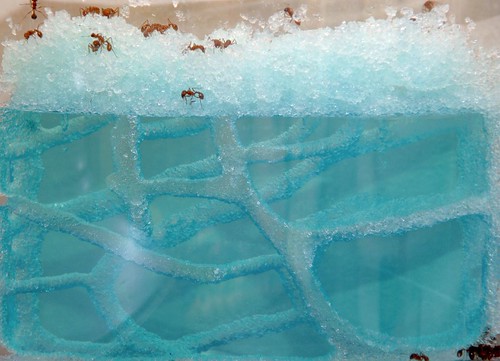 Activists antsy at ant farm Sunday Star Times | Sunday, 16 November 2008
Activists antsy at ant farm Sunday Star Times | Sunday, 16 November 2008I always find stories about animal exploitation to be emotional triggers for me. When I first read this story I was horrified buy the idea of ants living in a luminous blue gel. Perhaps some view them as 'just' insects but personally I think we need to respect all life, even an ants. It is the first step to respecting ourselves and each other.
If you want to do some real learning, build a real ant farm. Click here to learn how. English Online also has a nice level 2 unit plan on insects that incorporates an ant farm.
How do you feel about this, I realise that this kit could have learning benefits. Sold as a disposable toy, is it ethical? What do you think?

Kia ora Shaun!
ReplyDeleteGood luck on your journey to South Africa.
This ethical question you pose is a curly one.
I am not a vegetarian, though I've often thought about becoming one. The practicalities of it are difficult though certainly not impossible.
But when it comes down to considering animal exploitation I feel we have to consider things hollistically.
Rodeos and bull-fights are losing their tourist attraction for many, through the awareness of possible cuelty and what the trauma can mean to the animal victims.
But the reality is that sheep and cattle that are transported over country also become traumatised and this amounts to cruelty, as does the trauma they experience at their slaughtering.
In recent decades, people have also become more aware of the cruelty aspects of keeping birds in cages. Chicken farms have come under scrutiny, and with good reason.
If we project this to the fishing industries, we find similar considerations creeping in to the way the processes of catching and killing these creatures are regarded.
For as much as I enjoyed keeping an aquarium of tropical fish many years ago, I now wonder about the possible cruelty associated with that pastime.
Studies on consciousness have established that according to current definitions, the bee has a measurable degree of consciousness. For me, this means that even the insects should have a right to freedom in their lives. The Buddhists believe this.
It is a consideration when a tin of flyspray is used to kill a few wayward bluebottles.
Over ten years ago, my older daughter, Hannah, kept a pet brown tree-frog. She literally watched it grow from a tadpole. I developed a skill of catching flies in mid-air so that we could feed the little reptile on live food.
Hannah wrote many projects on her little pet frog. Her last essay on her frog was written after the frog had died. I recall her grief, and also her joy when she found that these frogs rarely live longer than 14 months in the wild. Her pet frog was 3.5 years old when it died.
How do we define cruelty? How can cruelty be measured? Was the little frog suffering for 3.5 years, when it may have enjoyed a year of freedom in the wild? What about the flies I caught for it? How do we quantify the cruelty factors there? Hmmm?
It can be a tough ethical problem when you think too deeply about all of this.
Ka kite
from Middle-earth
Ken, on some reflection I agree with you. I think that with guidance children can look after some animals and learn from them. As a boy I was always a collector of all manner of creepy crawlies. It drove my curiosity to learn but I also remember some things I did unsupervised as a kid that I would consider cruel now.
ReplyDelete